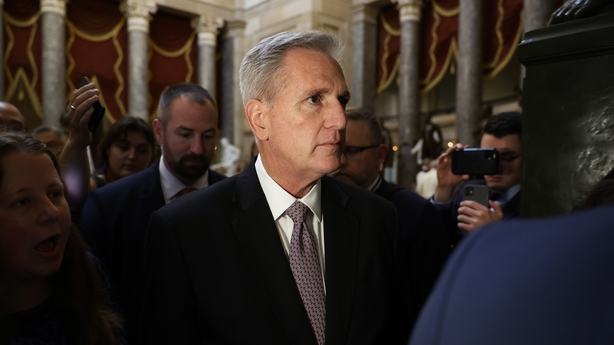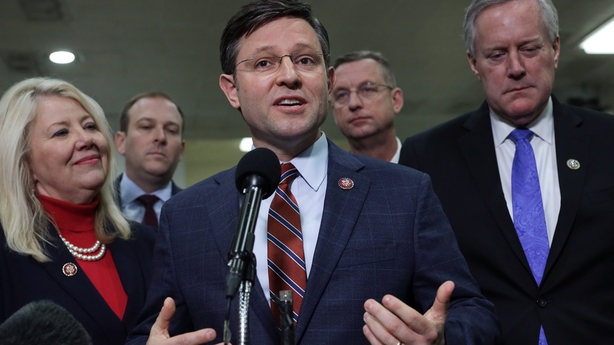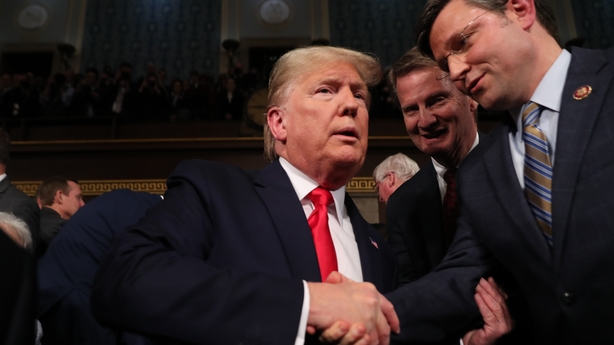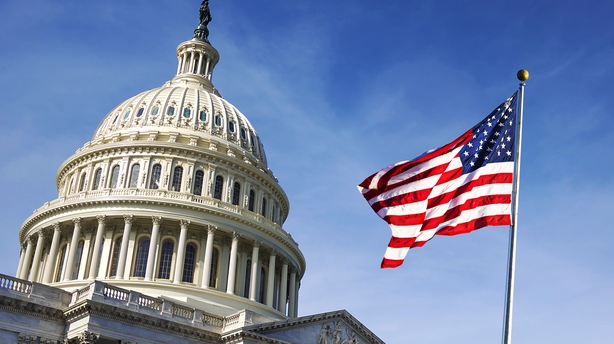Who is Mike Johnson? It's not just a question on the far side of the Atlantic. Here in the United States it's been pretty much the question of the day, now that Mr Johnson has become the Speaker of the House of Representatives, and therefore second in line to the Presidency of the United States.
Whilst he has not quite risen without trace, he is certainly little-known outside of his native Louisiana, and is definitely not a prominent figure on the national stage.
This may well have helped him in his rise to the top over the past three weeks, as the previous three candidates to replace Kevin McCarthy were all well known and therefore came with baggage; deals not honored, ideologies and egos clashing, jealousies, enemies.

In the toxic stew that the Republican party has made of itself over the past three and a bit weeks, it helped not to have a past.
It also helped not to have made one's name by being antagonistic or provocative, like Jim Jordan, nor to have been in any way anti-Trump, like Tom Emmer. The Chief Whip’s mayfly-like candidacy lasted barely a single day.
Mike Johnson was none of these things: sort of fresh, a member of the House since 2016. Civil in demeanor, a trait favourably noted by leading Democrat Representative Jim Clyburne. He seems well liked on a personal level on both sides of the political divide.
His very first statement on taking up the gavel was to thank the leader of the Democrats in the House, Hakim Jeffries, saying that although they disagreed on lots of things, they both loved their country and he was sure they would work together for the good of America. The tone sounded right.
He acknowledged that the House in particular, and the Congress in general, does not look good to the American public, only 20% of whom have a favorable opinion of it.
Mr Johnson says he wants to make them proud of their House of Representatives, and he intends to achieve that by getting them to work. Next week’s planned recess is scrapped, there is legislation to be passed.
He also scrapped the traditional celebrations for a new Speaker, and got straight down to business by passing a resolution condemning the Hamas attack on Israel and pledging US support.

But he also ticked a lot of boxes in terms of the Republican Party as it would like to be seen, particularly by those on the right of the party. Mr Johnson’s election year - 2016 - meant he was part of the Trump wave of newly elected members. And he is certainly a Trump supporter. Detractors have called him the first MAGA Speaker of the House.
In a break from his court appearance at his New York civil fraud trial, the former president said the new speaker was a good man and would be a great speaker. This after he had just been fined $10,000 for making comments about the clerk of the court in defiance of a gag order imposed by the judge.
Yesterday it was comments by Mr Trump on social media that torpedoed Tom Emmers campaign for Speaker, so the former president remains powerful among House Republicans, although his first choice, Jim Jordan, was too much for many in the House to bear.
And so they compromised on Johnson, not abrasive like Jordan, but a Trump loyalist. And not just in word. A lawyer by trade he was part of the team that defended Mr Trump in both his impeachment trials in the US Senate.
He also voted against certifying Joe Biden’s electoral victory in the 2020 election and was a supporter of the legal challenges to the election result. As speaker he will now play a role in certifying - or not - the next presidential election.

When asked if he was concerned that Mr Johnson might attempt to block his election if he wins in 2024, President Joe Biden said "no, because he can’t".
A religious man, Johnson cited his Christian faith at some length in his acceptance speech, saying God has raised up the members of the House to leadership positions in the country, including himself to the Speakers chair.
He is strongly anti-abortion, something that endears him to the right of the Republican Party, but not the centre ground of the party. More significantly it puts him at odds with the centre ground of the American voters.
The overturning of Roe v Wade (the US Supreme Court decision that effectively legalised abortion in all 50 states in 1973) proved to be a potent vote getter for the Democrats in last years mid-term elections and a vote loser for the Republicans.
This is a theme Niki Haley, one of the stronger contenders for the Republican presidential nomination, has promoted during her campaign - it's time for the Republicans to stop talking about abortion, and LGBTQ issues and all the other themes of the "War on Woke", as she believes most ordinary voters don’t want to hear about this kind of thing - they want something done about high inflation, high petrol prices, crime and the southern border.
How will Speaker Johnson navigate this territory? That remains to be seen. In such a senior leadership position he has to take account of a much wider range of views from different members. He is also expected to be a team player, to raise lots of money and spread it around the members, helping those in marginal seats get re-elected with visits and speaking engagements. Will his party loyalties and the demands of the office mean his own deep convictions have to take something of a back seat?
Not necessarily. Those who knew Johnson long before he became famous spoke yesterday of his skills as a smooth operator. Someone who can hold deeply conservative views, but not come across as angry or aggressive or over passionate or dismissive or argumentative. Just as a smooth, low key, quiet operator who gets things over the line.
One CNN journalist remembers coming across him 20 years ago when he was acting as a lawyer for an NGO trying to defend prayers in public schools, a contentious topic. He recalled Johnson as someone who stood out in a fractious climate because of his quiet authority, personal charm and non-confrontational tactics. He thought Johnson would likely become a congressman, but never thought he would be Speaker of the House.
Now all of his skills will be put to the test in a most demanding and unforgiving environment. A relative newbie to the inner workings of Capitol Hill, Johnson does not have any first hand experience of negotiating at the top level between the White House and the Senate, perhaps the most important part of the job.

Now this relatively fresh unknown will be up against some of the gnarliest, most wily old foxes on the Hill in the shape of Joe Biden, and Senate party leaders Chuck Schumer and Mitch McConnell, who between them have amassed 118 years of experience in elected office in DC. He will also have to deal with Vice President Kamala Harris, his opposite number as chair of the Senate. She too is a lawyer first elected to the Senate in 2016.
He should have an easier relationship with the House Majority leader, Steve Scalise, a fellow Louisiana politician, who enthusiastically participated in Johnson's first acts as Speaker (sending formal notes on his election to the Senate and White House). Though some think he may have to rely more on the seasoned Scalise to keep his own party onside, which could see the Majority Leader gaining power at the Speakers expense.
Mr Johnson and every other member of the House knows they have a lot of ground to make up in repairing their tarnished reputation in the eyes of the American public. Observers expect he will deal with the most pressing budget issue - the looming government shutdown in 22 days time when the "continuing resolution" funding that got McCarthy out of the crisis a month ago runs out - by proposing a longer running "CR", that won't expire until January or maybe even April. This will avoid another pre-Christmas spending deadline, and the unpleasant row that ensues every year.
Programme of cuts
Johnson is a budget hardliner. He wants to see a long term programme of cuts that will bring revenues and spending into line, and will lead to proper budget procedures being followed for the first time since Bill Clinton left the White House. But he may judge it is wiser to give this issue a longer runway to buy more time to organise the Republican majority behind a budget package that might actually fly.
He also has to face dilemmas on President Biden's request last week for $106bn in extra money for Ukraine, Israel and the Southern border. The last two issues should not be a problem, but Johnson is on record as being opposed to supplying extra funds to Ukraine.
Mr Biden has tied the Israel request to the Ukraine request, which is unpopular with a majority in the Republican party in the House, but which is supported by the Republican leader in the Senate, Mitch McConnell. Obviously this is the issue most foreign observers will be watching closest in the coming weeks.
So it's his skills as a negotiator and therefore as a compromiser that will be tested most. Time is short in which to find out. His greatest ally in this testing time may be public opinion, and the knowledge among his fellow Representatives that they really need to be seen to be working for the greater good, not indulging in internal party bloodletting.
That might just be enough to buy him some political space in which to get some work done with the Democrats, the Senate and the White House. His right wing credentials may give him enough cover to get away with being less than ideologically pure, an essential requirement when trying to move things through a system of separated powers.






